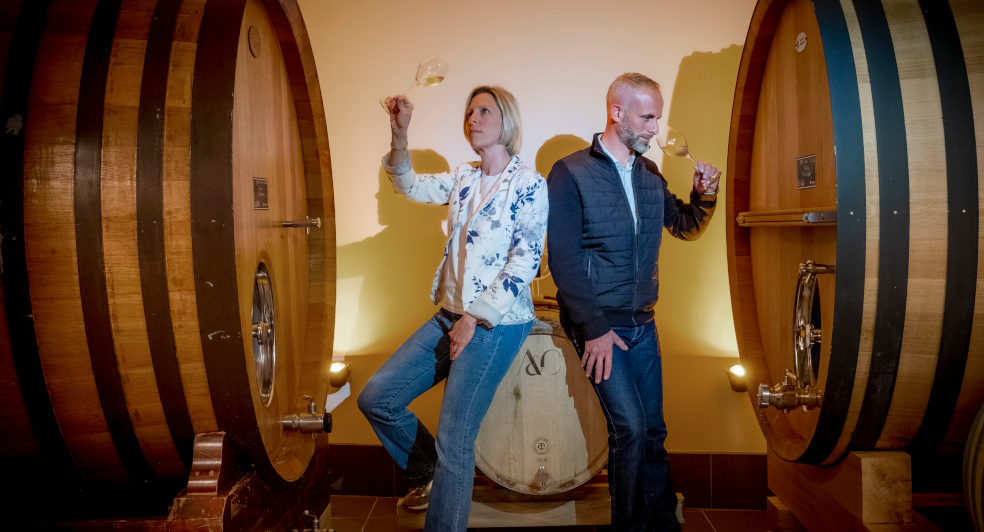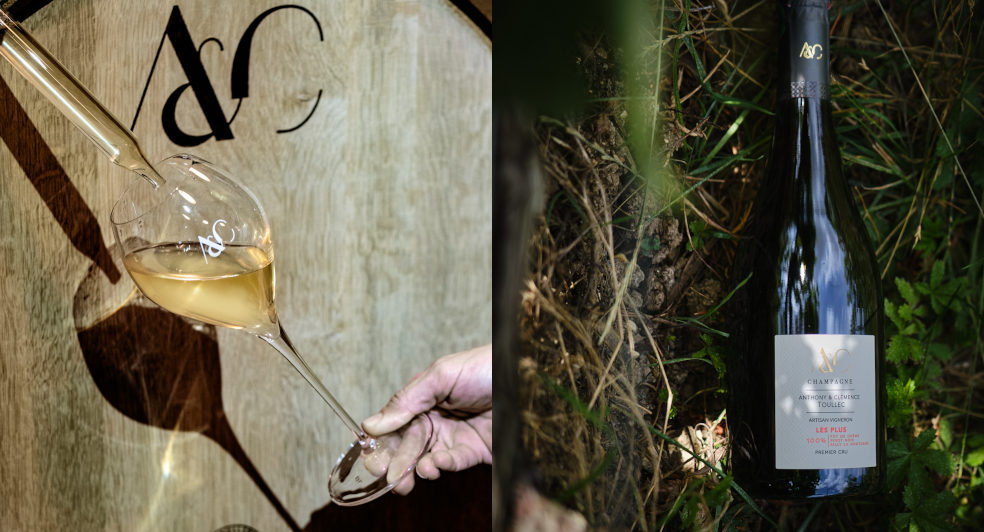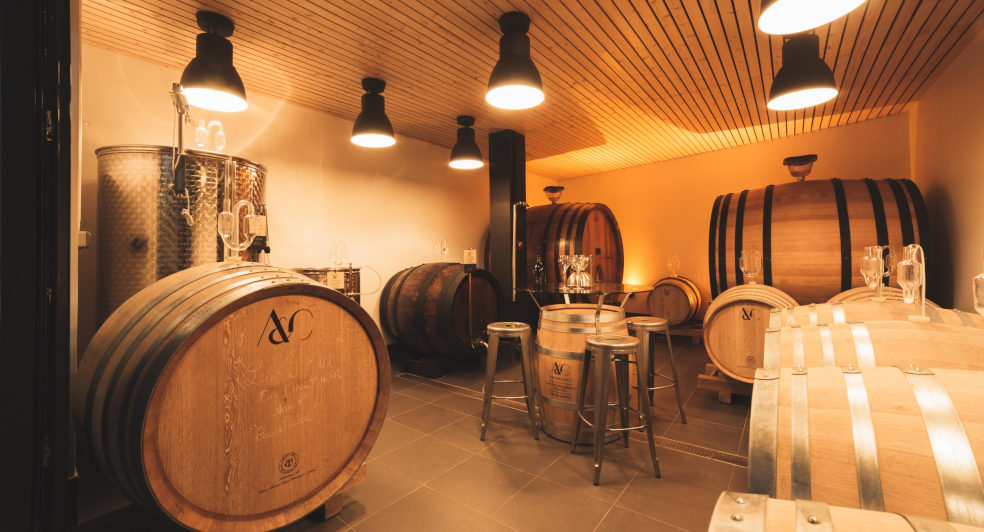Uncorking A Hidden Gem Of Champagne: Meet Clémence & Anthony Toullec
4th July 2024

The Bubble Makers Behind Champagne A&C Toullec
April in Champagne has intrinsically become associated with one event: Le Printemps des Champagnes.
In operation since 2009, Le Printemps des Champagnes has progressively morphed over the years into an inescapable annual rendezvous for sommeliers, cellar masters, champagne professionals, restauranteurs, journalists, and bloggers alike. And what exactly is percolating in Champagne to have everyone flock to the region? A week of exceptional tastings, networking and workshops.
This year marked my first in-person participation and to say that it was exactly like nothing else is an understatement. I now understand why, Le Printemps des Champagnes is a yearly pilgrimage for many, and most importantly, why every visit is a guaranteed trip down memory lane.
With so many incredible producers and (much to my chagrin) so little time, it was certainly a bit of a dizzying challenge to decide which ones were absolute must-visits. While the planned visits to go meet some of the talented growers I had previously interviewed and taste some exquisitely exceptional Champagnes were second to none, it was the unexpected encounters that surprisingly left an even deeper impression in my mind and heart. One such serendipitous moment was meeting Clémence and Anthony Toullec, the fifth generation managing the family-operated Champagne House, Champagne A&C Toullec.
Situated in the Montagne de Reims, the Champagne A&C Toullec House is first and foremost a family affair. Handed down from generation to the next, today husband-wife duo, Clémence and Anthony have taken the helm of the 5-hectare domain located in the Premier Crus villages s of Rilly-la-Montagne, Sacy, Montbré, Taissy and Avenay-Val-d’Or.
Certified HVE ‘High Environmental Value Exploitation’ and VDC “Sustainable Viticulture in Champagne”- rewarding sustainable agricultural practices – Clemence and Anthony are laser-focused on preserving and promoting an active and healthy ecosystem in their vineyards.
With that in mind, vinification is carried out on a parcel-by-parcel basis, and in oak barrels, particularly for their reserve perpétuelle.
Cultivating the 3-star grapes of Champagne (Meunier, Chardonnay and Pinot Noir) they carry on the family winemaking tradition crafting a well-regarded range of Champagnes that reflect the family’s commitment to producing exceptional wines that authentically showcase the uniqueness of their terroir.
In the world of Champagne, there are many hidden treasures waiting to be discovered and A&C Toullec is one of them! It was such a pleasure to meet this dynamic duo during Le Printemps des Champagnes. An unplanned encounter that was the perfect reminder of how magical connections can be fostered when two paths cross unexpectedly.
What an absolute delight it was to interview Clémence and Anthony upon my return to the USA. A&C Toullec is not just another story of a grower Champagne; it is a narrative of dedication, passion, climate adaptation, environmental implementation and family tradition.

Can you briefly retrace the history of your Champagne House?
For five generations our family has been elaborating Champagne in Rilly la Montagne, a premier cru terroir located on the Montagne de Reims (between Reims and Epernay). Our family reflects years of expertise, know-how, transmission and passion for the vine, our terroir and nature.
How did your Champagne adventure begin?
Both of us grew up in the countryside between vineyards and fields. At an early age, we would go help our parents and grandparents and it was thus very organically and naturally that in 2017 we took over the family lands and tools to continue this adventure.
How do you think the identity of your terroir is expressed in your Champagnes?
The identity of our terroir expresses itself in different ways.
First, we have what is happening in the soil dealing with clay-limestone and chalky soils.
The clay-limestone element brings filtration and freshness, and the chalk allows for the proper drainage of the soils.
Then we have what happens with the climate. Here we have both a continental and oceanic climate. The oceanic aspect of the climate allows for the vineyards to benefit from moderate climactic conditions. On the other hand, a continental climate can bring extreme conditions.
In winter the temperature can brutally drop (inferior to – 10 Celsius) bringing destructive frost, conversely in the summertime temperatures can rise and provoke violent storms.
And lastly, Champagne vineyards are ‘Vignoble de Coteaux’ (hillsides). Vines are predominantly planted on hillsides which offer optimal sun exposure and allow as well for the water from the rain to flow properly. All these elements impact the elaboration of our champagnes.

You focus on parcellar vinification for all your Champagnes. What are the advantages of this approach?
A parcellar winemaking approach will allow us to highlight each terroir of our plots as well different aromas. The way they are exposed to sunlight, the soil composition, and the grapes that are grown on each plot are all the different factors and traditions to produce exceptional and unique wines.
Of all the Champagnes you produce which one has particularly shaped your understanding of the house’s spirit and culture?
In Rilly la Montagne with Pinot Noir being the dominant grape, we have elaborated the cuvée ‘Les Plus’ (name of a Lieux-Dit) which reveals all the characteristics of this powerful and very aromatic black grape. We keep it in barrels which allows for a good aromatic balance.
What measures are you taking in the face of climate change?
Environment and climate change are very important topics for us. Our commune is part of the Regional Park of the Montagne de Reims. Our practice consists of grass cover, zero pesticide, and soil aeration which preserves the soil and avoids erosion. All these ultimately strengthen the quality of our grapes and terroir.
What legacy do you wish to leave in Champagne?
That would be the heritage of Champagne meaning:
• Share the know-how of each grower (men and women) one generation after the next
• Explore new horizons and continue to experiment.
• Respect nature and commit to preserve it
What is your most memorable Champagne moment?
Our most memorable Champagne moment was the tasting of our first Blanc de Noirs cuvée released in 2019.
For more information visit: https://www.champagne-toullec.com/en/accueil-english/
![]()
Mona Elyafi
Founder of ILDK Media, a boutique Public Relations and Digital Communications agency. Champagne specialist, educator, writer & consultant. She has WSET Level 2 Award in Wines certified and also Champagne Master Level by the Wine Scholar Guild.
